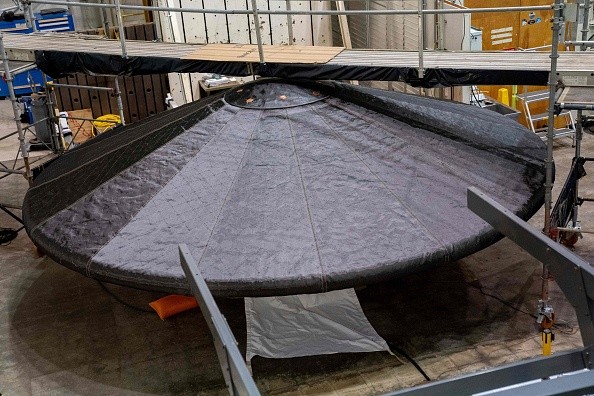The European Union has given €15 million to a group of European companies to help them make an inflatable heat shield that will be used to recover rocket stages and land spaceships on Mars.
The big goal of this project, called ICARUS, is to change the way people move through space and support environmental protection.

(Photo: Getty Images/ Stefani Reynolds)
How Inflatable Heat Shields Can Change Space Travel
The European Commission has given €10 million to the Inflatable Concept Aeroshell for the Recovery of a Reusable Launcher Stage (ICARUS) project as part of the Horizon Europe program. This project builds on the success of the EFESTO-1 and EFESTO-2 prototypes, which got a total of €5 million in funding.
The main idea is simple: instead of heavy, rigid heat shields, use inflatable ones that can be put up from small containers. This will make it safe for rocket stages and spaceship parts to be returned to Earth.
NASA has already shown how useful this technology could be. Their Hypersonic Inflatable Aerodynamic Demonstrator (HIAD) and the Low-Earth Orbit Flight Test of an Inflatable Decelerator (LOFTID) showed how inflatable heat screens can be used effectively.
However, ICARUS wants to push the limits even more. They want to use the technology on trips to Mars and to recover rocket stages.
The ICARUS project will have three stages: design, launch of a meaningful-scale test on a sounding rocket, and data analysis after the flight. The prototype, which DLR-Moraba made, will test the heat shield at hypersonic speeds, blowing it up from 50 cm to about 3 meters. Future models may grow to be 10 meters across.
READ ALSO: ESA's Vega-C Rocket Nears Return to Flight With Successful Tests Eyeing 2024 Relaunch
Making Space Recovery and Sustainability Better
Elecnor Deimos runs the group and has essential partners such as the French Aerospace Research Center (ONERA), the Italian Aerospace Research Center (CIRA), and the German Aerospace Center (DLR-MORABA). Each partner brings a different set of skills to the project, such as tracking vehicles' health, developing new sensor technologies, and protecting them from heat.
ICARUS's project manager, Giuseppe Guidotti, stressed the importance of working with DLR-Moraba on the flight test program. "DLR-Moraba is crucial for designing, customizing, and managing the flight test campaign," he said. The project's first flight test is set for 2028, and the whole thing is supposed to take four years.
Simone Centuori, CEO of Deimos, talked about how innovative and valuable ICARUS is. Some of the best study groups and companies are working on this project, which is one of the most creative of the decade.
He stated that ICARUS would revolutionize the approach Europeans take to re-entry technologies. He further explained that it would assist in areas such as the recovery of rocket stages and hypersonic entry on Mars.
Inflatable heat shields, also known as Inflatable Atmospheric Decelerators (IADs), are a big step forward in technology for re-entry. They can be quickly launched from launch vehicles and have a low re-entry ballistic coefficient, lowering mechanical and aerothermal loads. Because of this, they are perfect for recovering and reusing launcher stages and other space goods, which makes space a lot more sustainable.
If IADs had guidance, navigation, and control (GNC) systems added to them, they could be even more useful and help them hit their targets more accurately on Earth and Mars. If ICARUS works, it could change how people move through space, making trips safer and longer.
The head of ONERA's space program, Jean-Marc Charbonnier, said he had faith in the consortium's knowledge. He pointed out that the ICARUS team comprises experienced study groups and businesses, who have shown what they can do by doing well in the EFESTO projects.
ICARUS wants to show that flexible heat shields can work and be useful. Technology that can be used more than once and last longer could change the space business. This project will completely change how we move through space and take care of the Earth in the future.
RELATED ARTICLE: European Space Agency Goes to NASA for Mars Rover Launch Using Pioneering Nuclear Power Source After Splitting with Russia
Check out more news and information on Space in Science Times.














